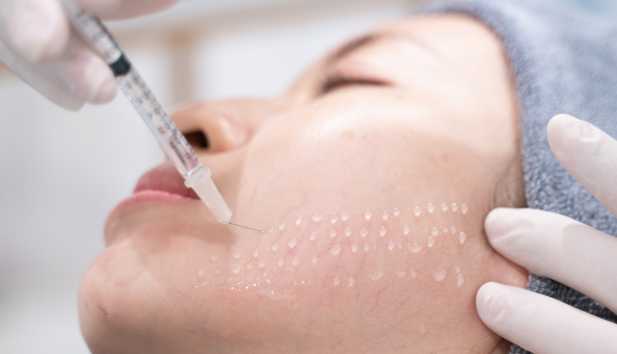What is Mesotherapy?
Mesotherapy is a technique that uses injections of vitamins, enzymes, hormones, and plant extracts to rejuvenate and tighten skin, as well as remove excess fat.
The technique uses very fine needles to deliver a series of injections into the middle layer (mesoderm) of skin. The idea behind Mesotherapy is that it corrects underlying issues like poor circulation and inflammation that cause skin damage.
There isn’t a standard formula for the substances injected in Mesotherapy. Doctors use many different solutions, including:
- enzymes like collagenase and hyaluronidase
- herbal extracts
- vitamins and minerals
Benefits of Mesotherapy
- Mesotherapy can instantly improve dull, tired looking skin and superficial wrinkles but can also help to improve sluggish blood circulation, aiding the body to flush out aging toxins. This treatment can also be used to address hyperpigmentation, treat acne and ‘lit-from-within’ skin glow.
- Mesotherapy vitamin cocktails can stimulate the fibroblast cell in the skin to produce more collagen to combat the signs of aging. Amongst the list of skin-friendly plant ingredients injected are vitamins, growth factors, Hyaluronic acid, peptides, antioxidants and trace elements that provide the ideal environment for healthy skin that copes with the aging process better.
- A typical Mesotherapy cocktail might generally contain over active 50 ingredients to nourish, repair and rejuvenate skin.
- It’s definitely worth doing if you have an event that you want a quick-fix for, and can be combined alongside anti -wrinkle injections and fillers.
What to expect?
During each session, you may or may not have numbing medicine applied to your skin. You’ll get a series of injections using a special short needle. The needle may be attached to a mechanical gun to deliver many injections in a row.
The injections can be given at different depths — from 1 to 4 millimeters into your skin — depending on what condition you’re having treated. Your doctor may place the needle into your skin at an angle, or flick their wrist very quickly while injecting. Each injection may only place a tiny drop of the solution into your skin. You’ll probably need several Mesotherapy sessions to get the desired effect. You should expect to return to the doctor between 3 to 15 times. At first, you’ll get the injections every 7 to 10 days. If your skin starts to improve, the treatments will be stretched out to once every two weeks or once a month.
What are side effects of Mesotherapy?
Like with any other cosmetic injection procedure, very rare side effects might include bruising, reaction to the injected vitamin cocktail , infection, inflammation and swelling.
Side effects that have been reported include:
- nausea
- pain
- sensitivity
- swelling
- itching
- redness
- bruising
- bumps at the injection site
What to do before the treatment?
- Avoid use of non-steroidal anti-inflammatory drugs (NSAIDs like aspirin, motrin, advil, ibuprofen, or any other non-tylenol, non-acetaminophen product) for 7 days prior to treatment to minimize the potential for bruising, unless the medications involved are prescribed for the treatment of an existing medical condition. If you must use these medications please let your provider know.
- If you are on a blood thinner, please let the doctor know. You will be at an increased risk of bleeding and bruising during the procedure.
- If you have a history of fever blisters, take antiviral medication starting 1 day prior and follow the directions on your prescription.
- Stop all topical acids (like glycolic, alpha or beta hydroxyl acids), retinols, retin-A, or other like products 7 days prior to treatment.
- Avoid tanning beds, self tanners or prolonged exposure to the sun 4 days prior to treatment. Always use a zinc oxide based sunscreen with SPF 30+.
- If you are planning to receive Botox, make sure that you give yourself at least 2 weeks post-Botox injections before receiving this procedure.
- Wait 6 months following oral isotretinoin (Accutane) use before having this treatment done.
What to do after the treatment?
- Expected downtime: 3-5 days. The expected healing sequence and expected treatment side effects include redness, swelling, bruising, light discomfort, and possibly small bumps, scabs and pinpoint bleeding.
- Do not go swimming/sauna/steam room for at least 24 hours post-treatment.
- Mineral makeup may be applied 24 hours after treatment
- During the first two days following treatment, care should be taken to prevent irritation/trauma to the treated area: avoid hot baths & massage.
- No exercising or strenuous activity for the first 24 hours post-treatment. Sweating and gym environments must be avoided during the first 72 hours post-treatment.
- Avoid intentional and direct sunlight for 48 hours. No tanning beds. Try to avoid excessive sun exposure on the treatment area and use a sunscreen (SPF 30+) daily for one month following the procedure.
- Cleanse the treated area with mild cleansers or soaps without perfumes or acids, and avoid washcloths and harsh cleansers until all transient healing processes have resolved naturally or at least 7 days.
- For at least 7 days post treatment, do NOT use any Alpha Hydroxy Acids, Beta Hydroxy Acid, Retinol (Vitamin A), Vitamin C (in a low pH formula) or anything perceived as ‘active’ skincare. It is recommended that you use a topical growth factor daily starting at 24 hours post-treatment.
- If you are planning to receive Botox or fillers, make sure that you.
What are contradictions?
- Pregnant/Nursing
- HIV/AIDS
- Cancer (all forms)
- Undergoing chemotherapy or immune therapy
- Immunodeficiency
- Lupus
- High blood pressure (uncontrolled)
- Insulin dependent diabetics
- Prednisone and other steroid medications (treatment will increase inflammation)
- Heart problems or diseases
- Haemorrhagic disease, trauma or bleeding
- Scleroderma
- Family history of hypertrophic scarring or keloid formation
- Solar Keratosis
- Anticoagulants / Blood thinners (including but limited to Warfarin or aspirin)
- Nickel or stainless steal allergies
- Active Acne
Conditions that need a doctors letter to confirm the treatment is suitable before treatments can begin:
- Epilepsy
- Transplant Anti-Rejection Drugs
- Thyroid Disease
- Heart Disease
- Hypertension (High blood pressure treated with medication)
- Cancer - after 12 months
The list below is of things that require a waiting period until you can start treatments:
- Active skin infection of any type, such as herpes simplex, impetigo, flat warts. (wait until healed)
- Sunburn in the treatment area ( wait until completely healed)
- Have bacterial or viral diseases of the skin (wait until clear)
- Inflammation (wait until healed)
- Laser treatments — face only — 4-6 weeks post treatment
- Active Herpes – cold sores — must take anti-viral meds 2 weeks pre and post treatment (peels & needling)
- Warts (avoid Area)
- Ro-accutane (6 - 12 months post treatment)
Wait 3 months before commencing with treatments:
- Recent facial operations — must wait at least 3 months post surgery
- Tattooing / Cosmetic Tattooing (Treatment Area)
Wait 2 week before commencing treatments:
- Strong chemical peels - PH lower than 3.1.
- Botox and fillers
- Any recent invasive or stimulating skin procedures i.e. micro-dermabrasion, electrolysis, IPL
- Medications and supplements such as aspirin, vitamin E, ginkgo biloba, ginseng, St. John’s Wort, Omega 3/Fish Oil supplements, Ibuprofen, aspirin and other NSAIDS have a blood thinning effect and can increase the risk of bruising and swelling after injections
Stop using/taking 1 week before commencing treatments:
- Anti-inflammatory medications such as ibuprofen. These will interfere with the natural inflammatory process that is critical for your skin rejuvenation.
- Waxing or depilatory creams
- Retin-A


